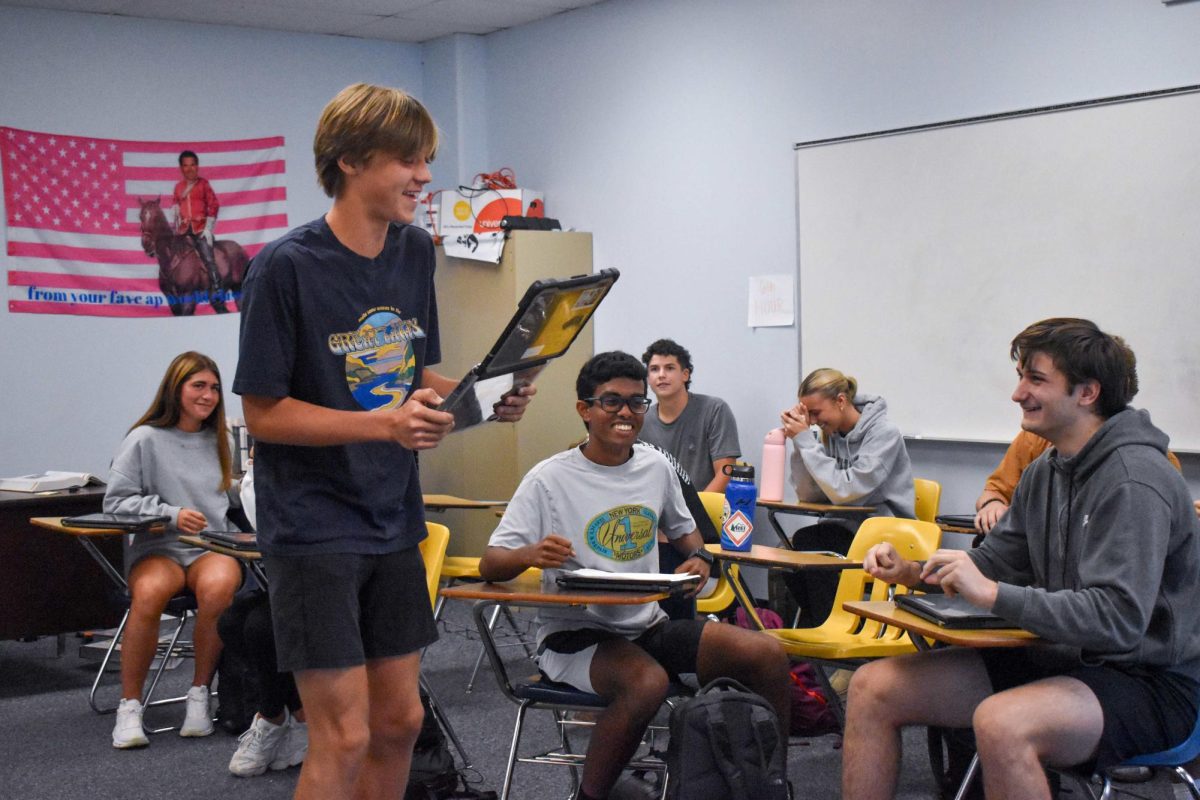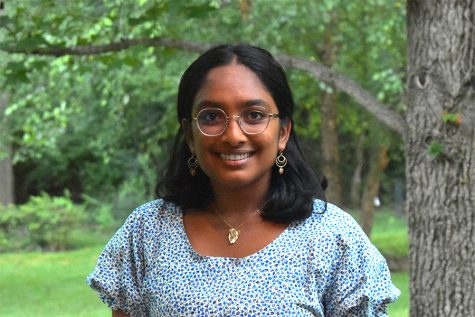The hallway is silent and still except for the occasional wanderer in search of the water fountain. A second glance finds seniors Nell Jaskowiak and Deirdre Jost settled on the floor by the Latin room.
Jaskowiak and Jost chose to take Greek as an independent study with Latin teacher Tom Herpel to fuel their desire to learn and get a head start on their future education. It also acts as an extension of the Latin track, as they finished out the available courses prior to senior year.
“I finished Latin V my sophomore year, and then I took AP Latin my junior year. Herpel has done Greek before with another student, and he suggested that, since I was already finished, I could continue on to Greek. I had pretty much beat the dead horse of Latin,” Jost said. “Learning in general just helps your brain build. Active learning strengthens the muscles in your brain, so I’d take Greek over a study hall anyday.”
Jaskowiak takes Greek and took Latin to gain a better understanding of the basis of modern and Western culture. This helps her build connections between what she’s learned and what she lives.
“I think it’s important to learn these languages because it shows how times may change, but people are still people,” Jaskowiak said. “There’s still going to be that one dude in the corner writing angsty break up poetry, and someone else ranting over there about how he’s going to take over the world.”
As participation in the humanities is decreasing as a national trend, Herpel is proud to see his students express and act upon their interest in the field.
“[When] students are interested in [the humanities] in high school, I think that’s going to carry over and help us learn more about the people around us and where we came from, so I’m excited that they’re carrying the torch into the future,” Herpel said. “I feel like I’ve done my job somehow.”
For Jaskowiak, gaining an education in Greek and other classical languages is essential because it enables her to form her own opinions on texts, such as many religious texts, still used in the modern world.
“All of those [religious] texts, as well as the more secular ones, have their bases in classical languages. We rely on those translators to give us an accurate interpretation, but I like finding out for myself,” Jaskowiak said. “When it comes to these texts that are so foundational for a culture, especially religious texts since those were often the cause of so much disagreement about how to best interpret it, being able to form my own opinions on them [is important to me].”
Independent study courses cultivate a self-motivated attitude, which colleges and employers often look for.
“The fact that they took an independent study to learn a new language with a new alphabet takes a lot of focus and a strong desire to learn in general,” Herpel said. “I think it shows that they are independent learners, that they value their education and that they want to spend more time learning about the world around them (whether it’s modern or ancient). The skill behind being able to balance your time, organize your time and spend your time wisely can be carried through the college education and through their adult life, beyond just the language itself.”
Jost is thankful for the freedom to pursue independent study options and develop her individualism.
“It’s a really great opportunity that Parkway gives students because it allows students to pick and choose and take what they want to take. [It allows them to] not be constrained by [only] what other people are interested in,” Jost said. “It allows kids to kind of design and learn what they want to learn which makes them more engaged in classes. Without Greek I would’ve been limited in my chances to get ahead, and independent studies look really good on college applications.”
Taking Greek as an independent study course helped Jaskowiak push her comfort zone and broaden her horizons during her high school career, as well as gain skills she wouldn’t have otherwise.
“It is really cool way to challenge myself because Latin and Greek are so vastly different due to different alphabets, stupid accidents and everything that comes with that, as well as their slightly different world views because they are two very different situations,” Jaskowiak said. “It’s an opportunity that I’m very glad I’ve gotten because it’s one that I know I have benefited from and that I will continue to benefit from. Gaining these skills to figure this stuff out and working on the problem solving behind it [is beneficial to me].”

![Writing Greek prose on the whiteboard, seniors Nell Jaskowiak and Deirdre Jost practice their letters and accents during their independent study. Taking Greek enables Jost to better prepare for a variety of possible futures, both through the content itself and the skills she retains. “Greek actually has a whole bunch of different accent marks which is not something you have in English,” Jost said. “I feel like I'd like to take [another] language, maybe Spanish or French, in the future and having learned the Greek language with different alphabets and different accent marks might make it easier to learn that language, whatever it may be.”](https://pwestpathfinder.com/wp-content/uploads/2019/03/DSC_0002edited-1-900x600.jpg)


![Freshman Daphne Stokes looks at a table with Veterans Day flyers and information on Nov. 11. Stokes, along with other West High students, like senior Alexander Lewinski, passed by the table in the cafeteria with army recruitment information and giveaways for students to observe during lunch. “Talking with [the recruiters] has definitely helped me [find] where I wanted to go, more than anything else,” Lewinski said.](https://pwestpathfinder.com/wp-content/uploads/2025/11/DSC_1227-2-1200x800.jpg)
![Helping a customer, print room assistant Gretchen Williams operates her booth at the West High Craft Fair from Oct. 25-26. This was Williams’ first time participating in the Craft Fair with her new craft shop, Gs Beaded Boutique. “People have always said, over the years, ‘you should open something.’ [I replied that] I would rather just make [my crafts as] gifts for people. I just started [the online store] up, and it's been okay. I'm always surprised [by] how many views I get and [the] people from different states buying things; somebody from Alaska bought something the other day.”](https://pwestpathfinder.com/wp-content/uploads/2025/11/DSC0451-2-1200x799.jpg)
![Gesturing toward the club’s name on the board, Global Youth Aid co-president year Daniah Alsagheer discusses upcoming service projects with members during a meeting on Oct. 30. “We might be one club at one school, but together, we’re [part of] something much bigger,” Alsagheer said.](https://pwestpathfinder.com/wp-content/uploads/2025/11/DSC00949-1200x800.jpg)
![Focused on providing exceptional service, sophomore Darsh Mahapatra carefully cleans the door of a customer’s car. Mahapatra has always believed his customers deserve nothing less than the best. “[If] they’re trusting us with their car and our service, then I am convinced that they deserve our 100 percent effort and beyond,” Mahapatra said.](https://pwestpathfinder.com/wp-content/uploads/2025/10/DSC_0018-1200x800.jpg)
![Sophomore Aleix Pi de Cabanyes Navarro (left) finishes up a soccer game while junior Ava Muench (right) warms up for cross country practice. The two came to Parkway West High School as exchange students for the 2025-2026 school year. “The goal for the [exchange] program is to provide opportunities for both Parkway students and our international exchange students to learn about other cultures, build connections and become confident, capable, curious and caring — Parkway’s Four C’s — in the process,” Exchange Program Lead Lauren Farrelly said.](https://pwestpathfinder.com/wp-content/uploads/2025/10/Feature-Photo-1200x800.png)

![Gazing across the stage, sophomore Alexis Monteleone performs in the school theater. The Monteleone family’s band “Monte and the Machine” has been releasing music since 2012, but Alexis started her own solo career in 2024 with the release of her first single, Crying Skies. “My whole family is very musical, [and I especially] love writing [songs with them],” Monteleone said.](https://pwestpathfinder.com/wp-content/uploads/2025/09/DSC7463-1200x798.jpg)
![Amid teaching a lesson to her AP Calculus BC class, Kristin Judd jokes alongside her students in their funny remarks. Judd has always enjoyed keeping the mood light in her classroom, along with on the volleyball court. “[I enjoy] that side talk where you see [or] overhear a conversation and chime in, or somebody says something funny,” Judd said.](https://pwestpathfinder.com/wp-content/uploads/2025/09/image-1200x730.jpg)
![Eyeing the ball, junior Ella McNeal poses for her commitment pictures at Clemson University. McNeal’s commitment comes after months of contact with top Division 1 soccer programs. “ It has taken a lot to get to where I am, but I know that [what] I've already been through is just the beginning, and I can't wait for what is to come,” McNeal said.](https://pwestpathfinder.com/wp-content/uploads/2025/09/IMG_4926-1200x900.jpeg)
